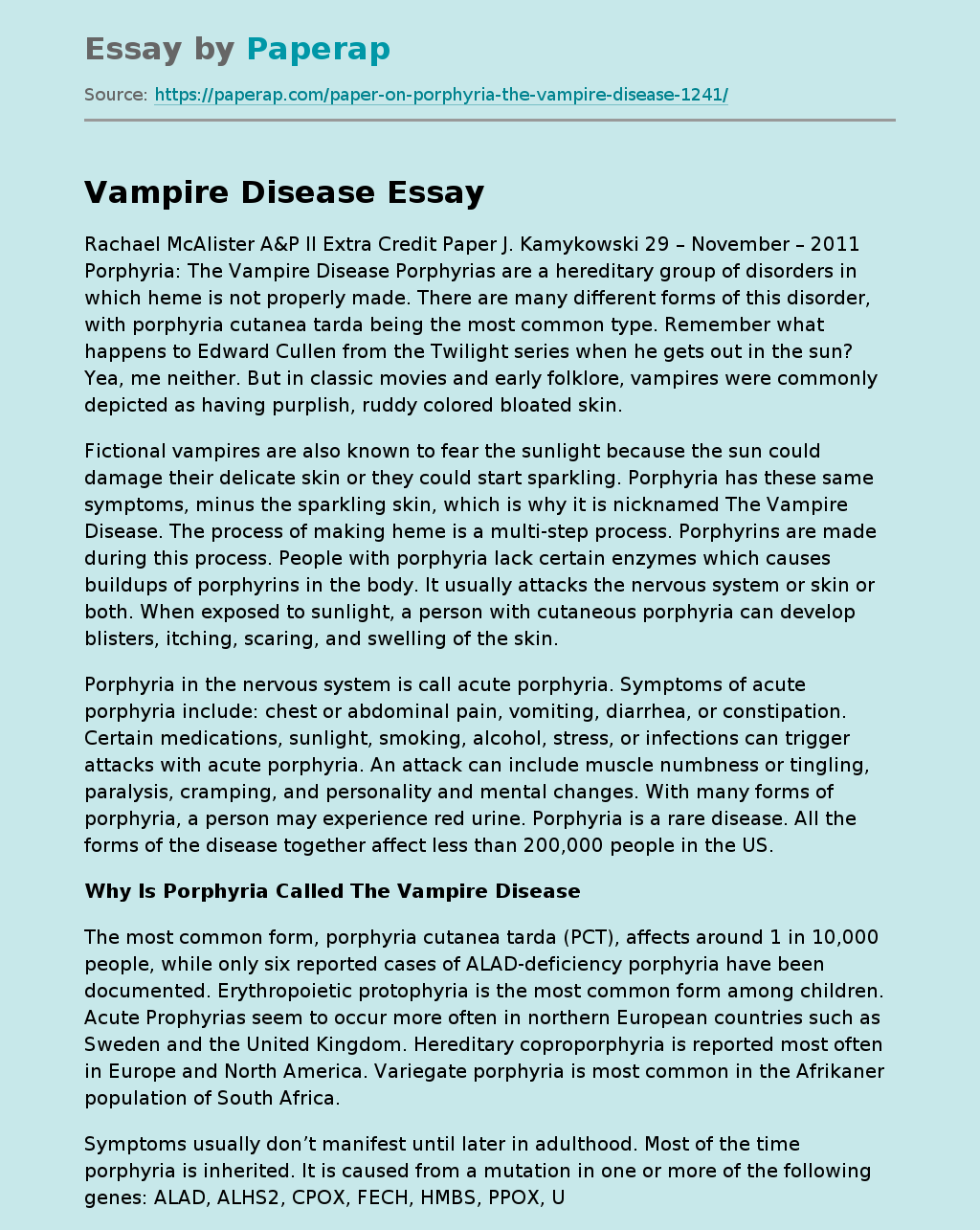Vampire Disease
Rachael McAlister A&P II Extra Credit Paper J. Kamykowski 29 – November – 2011 Porphyria: The Vampire Disease Porphyrias are a hereditary group of disorders in which heme is not properly made. There are many different forms of this disorder, with porphyria cutanea tarda being the most common type. Remember what happens to Edward Cullen from the Twilight series when he gets out in the sun? Yea, me neither. But in classic movies and early folklore, vampires were commonly depicted as having purplish, ruddy colored bloated skin.
Fictional vampires are also known to fear the sunlight because the sun could damage their delicate skin or they could start sparkling. Porphyria has these same symptoms, minus the sparkling skin, which is why it is nicknamed The Vampire Disease. The process of making heme is a multi-step process. Porphyrins are made during this process. People with porphyria lack certain enzymes which causes buildups of porphyrins in the body. It usually attacks the nervous system or skin or both.
When exposed to sunlight, a person with cutaneous porphyria can develop blisters, itching, scaring, and swelling of the skin.
Porphyria in the nervous system is call acute porphyria. Symptoms of acute porphyria include: chest or abdominal pain, vomiting, diarrhea, or constipation. Certain medications, sunlight, smoking, alcohol, stress, or infections can trigger attacks with acute porphyria. An attack can include muscle numbness or tingling, paralysis, cramping, and personality and mental changes. With many forms of porphyria, a person may experience red urine. Porphyria is a rare disease. All the forms of the disease together affect less than 200,000 people in the US.
Why Is Porphyria Called The Vampire Disease
The most common form, porphyria cutanea tarda (PCT), affects around 1 in 10,000 people, while only six reported cases of ALAD-deficiency porphyria have been documented. Erythropoietic protophyria is the most common form among children. Acute Prophyrias seem to occur more often in northern European countries such as Sweden and the United Kingdom. Hereditary coproporphyria is reported most often in Europe and North America. Variegate porphyria is most common in the Afrikaner population of South Africa.
Symptoms usually don’t manifest until later in adulthood. Most of the time porphyria is inherited. It is caused from a mutation in one or more of the following genes: ALAD, ALHS2, CPOX, FECH, HMBS, PPOX, UROD, and UROS. These genes provide instructions on how to produce the enzymes needed to make heme. 20% of cases are related to mutations in the UROD gene. Some types are inherited in an autosomal dominate pattern. This means that one copy of the gene in each cell is mutated. This increases the risk of developing signs and symptoms of the disease.
Other forms are inherited in an autosomal recessive pattern, meaning that both copies of the gene in each cell is mutated. Most often, the parents do not show any signs or symptoms when this is the case. Erythropoietic protophyria has an X linked dominate pattern of inheritance. Males may experience more severe symptoms of the disease than women. One of the main treatment options is the avoid the sun. A patient should quit smoking and drinking alcohol not only to aid in the benefit of their porphyria, but for overall health.
Therapeutic phlebotomy may be used to improve heme production. Hematin may be administered intravenously in the event of a sudden acute attack. Pain medication, propranolol, and sedatives may also be used in this situation. Other treatment may include: Beta-carotene supplements, chloroquine, and fluids and glucose to boost carbohydrate levels. A high carbohydrate diet is recommended for patients with porphyria. Panhematin® is the only available heme therapy treatment in the US. It is administered via a large central line or port.
It is used to correct heme deficiency in the liver and repress the production of porphyrin precursors. Next time you are watching Dracula, pay close attention to his skin. His purplish, easily bruised or injured skin closely resembles the skin of someone with porphyrin. These people have to limit their time in the sun or they will blister. Sometimes they can experience problems breathing or chest pains. This disease, nicknamed The Vampire Disease, is rare but very painful for those that suffer from it. Works Cited Porphyria. ” NCBI. gov. U. S. National Library of Medicine, 28 Feb. 2011. Web. 29 Nov. 2011. “Porphyria. ” MedlinePlus. U. S. National Library of Medicine, 1 Nov. 2011. Web. 29 Nov. 2011. “Porphyria. ” Genetics Home Reference. U. S. National Library of Medicine, July 2009. Web. 29 Nov. 2011. American Porphyria Foundation, 2010. Web. 29 Nov. 2011. Sassa, Shigeru. “Modern Diagnosis and Management of the Porphyrias. ” Brittish Journal of Haematology 135. 3 (2006): 281-292. Academic Search Elite. Web. 29-Nov. 2011
Vampire Disease. (2019, Dec 05). Retrieved from https://paperap.com/paper-on-porphyria-the-vampire-disease-1241/

